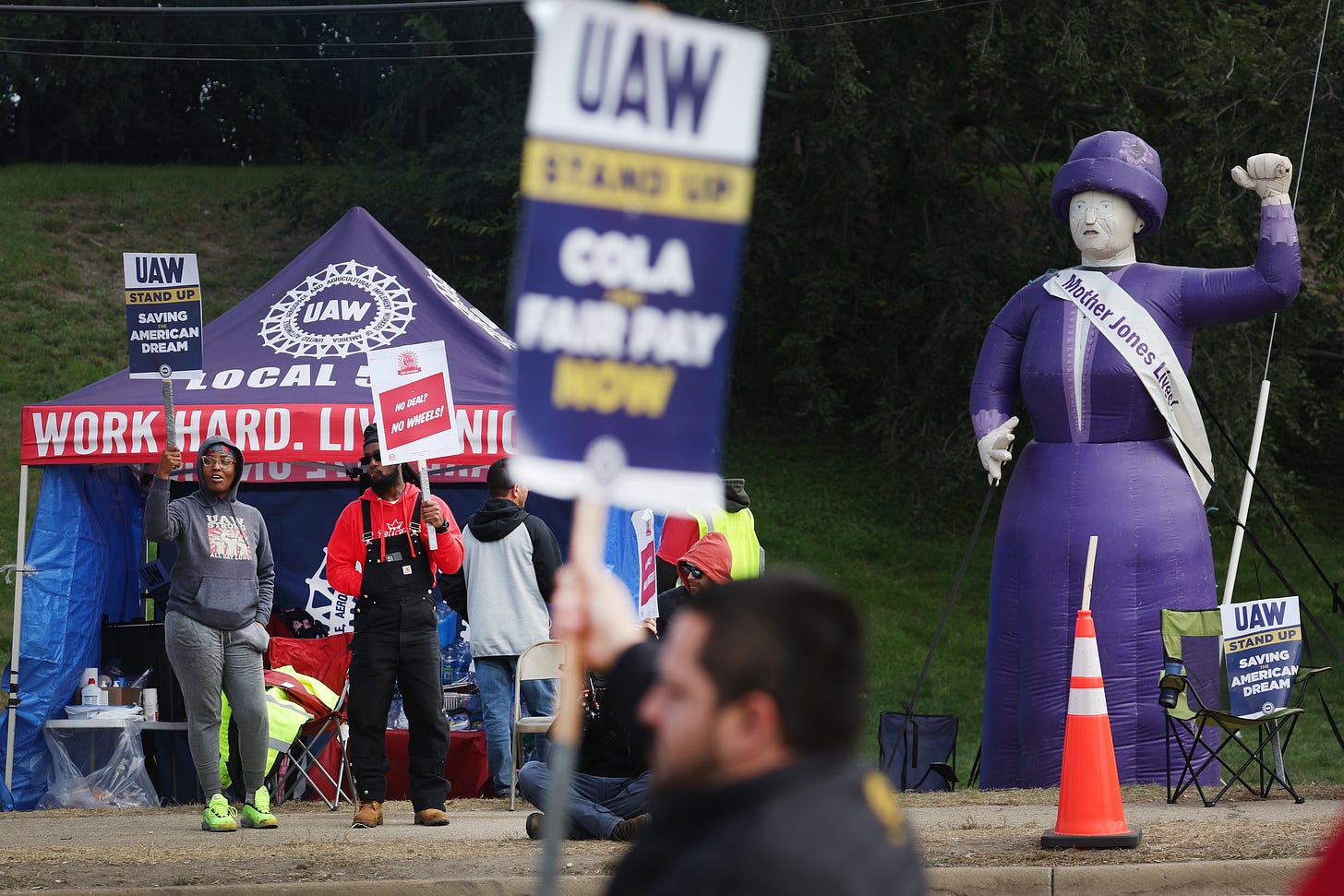The great union comeback, explained
A conversation with writer and activist Kim Kelly on the resurgent power of labor, its tricky relationship with the Democrats, and the prospects for a general strike
This past weekend, awakening to the very real threat authoritarian parties pose to democracies, some 1.4 million people took to the streets across Germany, the culmination of a week of demonstrations sparked by revelations that representatives from the far-right Alliance for Germany (AfD) had met with other far-right groups to plan for mass deportations of immigrants — including naturalized German citizens. Even German Chancellor Olaf Scholz turned out to protest. There’s now serious talk of barring the AfD from this year’s elections, even as it leads the polls in the states of Thuringia, Saxony, and Brandenburg.
Meanwhile in Argentina, three major trade union federations are launching a general strike today, the latest and largest action in a month of protests against new president Javier Milei’s anti-democratic “shock treatment” austerity package of privatization, deregulation, and curtailment of civil liberties. The demonstration is timed to pressure Argentina’s Chamber of Deputies, which meets Thursday to vote on whether to move Milei’s bill on to the Senate.
That’s the power of collective action for you.
Here in the United States, calls to defend democracy have sometimes left potential voters cold — and the door open for autocrats. Too often, the Democratic Party has been unable to figure out how to satisfy enough of a cross-section of its constituency to really motivate them. Good news about shoring up the pandemic-ravaged economy remains an abstraction for people concerned about the price of eggs or milk, or with rising rents. The party’s position on the war in Gaza has seriously alienated supporters on the left, and a looming compromise with Republicans on immigration threatens further damage.
There’s clearly a hunger for democratic participation: the past few years have seen the largest mass mobilizations in American history. Some 5.2 million people participated in the Women’s March in 2017; Black Lives Matter — the largest protest movement in United States history — got as many as 26 million people into the streets nationwide in the summer of 2020.
But political success has been elusive. The Supreme Court’s reversal of Roe v. Wade has severely curtailed women’s rights, while backlash from the right and center has undone much of the progress made towards policing and prosecution reform following George Floyd’s murder. DEI efforts are now under heavy siege. There’s a clear need for a movement that can make a real case for democracy, on its own merits, and deliver the political goods people want.
Organized labor, on the other hand, after a long period of grass-roots democratization and a house-cleaning, has brought in new leadership at some of the biggest unions and has been offsetting losses in traditional industries with an influx of new members from education, healthcare, and the service industries (overall union membership has grown slightly, while rates remained about flat at 10 percent). Aggressive new strategies have resulted in major victories, and the UAW in particular has built new political leverage.
The lessons are there to be learned. Joe Biden’s visit to a UAW picket line — the first time a sitting president has ever done such a thing — and his vocal support for a workers’ victory in the strike would be difficult to imagine had unions not reestablished themselves as a center of political power. Shawn Fain, the president of the UAW, has gone so far as to signal the possibility of a general strike in May 2028, presaging an era of significant labor activism.
To talk about what labor’s resurgence means, within the movement and for the country at large, we spoke with journalist and activist Kim Kelly. A contributor to The Washington Post, The Nation, The Guardian, and the Columbia Journalism Review, among many others, Kelly has made a career of explaining the labor movement to general audiences — even to readerships that may seem unlikely (if you’ve talked with a younger person lately about the idea of a general strike, there’s a good chance they learned about it through Kelly’s writing on the subject in Teen Vogue).
Kelly is the author of Fight Like Hell: The Untold Story of American Labor, a history of the struggle for workers’ rights in the United States that foregrounds the concurrent fights for race, class, and gender equity that shaped the union movement.
The labor movement in this country is stronger than at any time in recent memory, winning real victories, but at the same time electoral democracy in the United States seems to be on the ropes. How does labor activism fit into the larger context of struggles over democracy?
Honestly, I think that the labor movement, especially over the past few years, really should be held up as a shining example of what our democratic process should look like, especially in terms of what the UAW and several other unions have done (or are now trying to do) with one member, one vote campaigns. They’re moving towards more direct democratic processes to elect their leaders, making sure that every member's vote actually counts.





